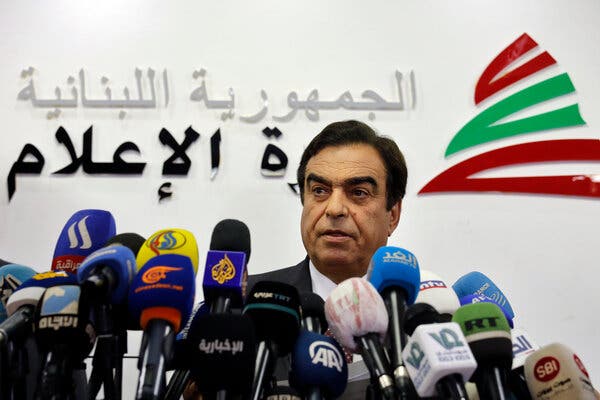French President Emmanuel Macron and Saudi Arabian Crown Prince Mohammed bin-Salman (MBS) announced a joint initiative to resolve the diplomatic crisis between Lebanon and the Gulf over remarks made by a Lebanese lawmaker criticising the Saudi-led war in Yemen. Macron met with MBS in Jeddah on Saturday as part of his tour of the region.
During a phone call between Macron, MBS, and Lebanese Prime Minister (PM) Najib Mikati on the same day, the French and Saudi leaders said that they will “work in a very concrete way” to restore normalcy in ties between Lebanon and Gulf states. PM Mikati welcomed the “great efforts” being made by Paris and Riyadh to “stand by the Lebanese people.” He also vowed to “strengthen relations” with Saudi Arabia and Arab states and “reject everything that would harm their security and stability.”
In October, remarks made by Lebanese Information Minister George Kordahi criticising the Saudi-led war in Yemen led to a diplomatic crisis with Saudi Arabia and other Gulf countries. Kordahi had said that the Saudi-led coalition was bombing “homes, villages, funerals, and weddings” in Yemen, called the war in Yemen “futile”, and said it was “time for it [coalition] to end” the war. He also said that the Iran-backed Houthi rebels are “defending themselves […] against external aggression.
Following Kordahi’s remarks, Saudi Arabia, the United Arab Emirates (UAE), Bahrain, and Kuwait withdrew their ambassadors from Lebanon and expelled the Lebanese envoys from their countries. Riyadh had also announced the suspension of all Lebanese imports, which came as a blow to Lebanon’s already reeling economy.

Kordahi, who had refused to step down for weeks, finally bowed to Saudi pressure and announced his resignation on Friday, saying that he hoped it would resolve the diplomatic crisis. “I decided to give up my ministerial position because Lebanon is more important than I am,” he said.
During the call, the trio agreed to “work together” to help ease Lebanon’s economic crisis. A Saudi-French joint statement said that the two sides would help Lebanon in implementing measures to tackle the country’s economic and political crisis. The statement also noted that Lebanon should not be used as a “launching pad for any terrorist attacks that destabilise the country and security of the region,” referring to the Iran-backed militia group Hezbollah.
Moreover, the leaders stressed the importance of strengthening the role of the Lebanese army in maintaining the country’s “security and stability.” Additionally, they agreed to establish a joint mechanism to provide humanitarian assistance to Lebanon.
The World Bank has stated that the country’s economic crisis ranks as one of the worst that the world has witnessed in over 150 years. It reported that “Lebanon is enduring a severe and prolonged economic depression, which is among the most severe crisis episodes globally since the mid-nineteenth century.”
The Lebanese pound has lost almost 90% of its value since 2019 and almost three-quarters of its population is on the brink of poverty. The country is also facing severe food, medicine, and fuel shortages. Its GDP growth rate has crashed by around 40%, unemployment levels have skyrocketed, and inflation has soared.

